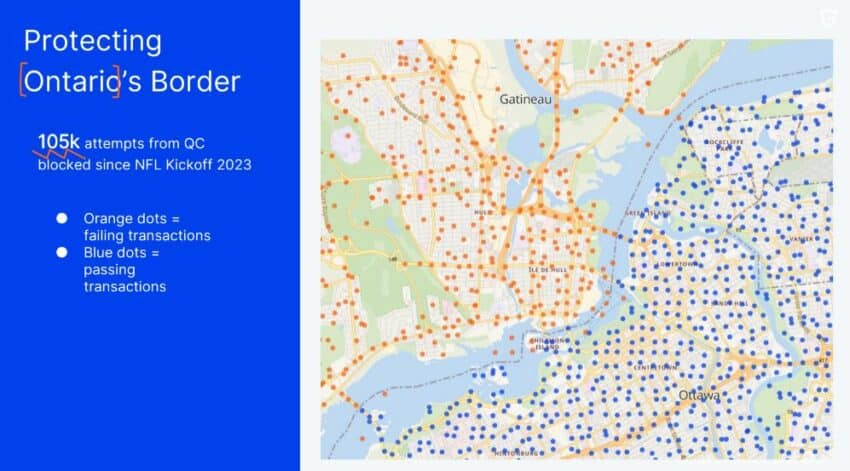
A new survey conducted by Mainstreet Research has found that roughly two-thirds (67%) of Quebeckers are in favour of the creation of a new regulated igaming framework, like recently adopted by Ontario.
The study, which found 73% of Quebeckers are already wagering with privately-operated online casino and sports betting platforms via the grey market, was commissioned by the Québec Online Gaming Coalition, a group of eight private online gaming operators and suppliers (Betway, Bet99, DraftKings, Entain (BetMGM), Flutter (FanDuel and PokerStars), Rush Street Interactive (BetRivers), Apricot Investments, and Games Global), that have merged in an attempt to end Loto-Québec’s monopoly on the online gaming industry in the province and advocate for a new regulated igaming system consisting of private operators.
The survey of more than 1,000 Quebeckers also found that only 26.6% are using Loto-Québec’s Espace Jeux to play online casino games or to place sports wagers. Additionally, 72% of Québec players who use Loto-Québec’s Espace Jeux platform do so to exclusively buy lottery tickets. And 56% of Québec players agreed that the creation of an independent regulatory body to oversee the entire gaming offer in Québec, including Loto-Québec, would provide greater oversight amid growing concerns about consumer safety and responsible gaming.
In Canada, provinces are responsible for “conducting and managing” gambling activities in their respective jurisdictions. That means the Quebec provincial government will ultimately decide whether or not to privatize the online gambling industry within provincial borders or to continue allowing Loto-Québec to offer the only legal games for consumers.
‘’These results show that Loto-Québec’s monopoly only exists on paper, and the Crown Corporation’s recent assessment of its market share does not reflect reality,’ said Nathalie Bergeron, the Coalition’s spokesperson, in an email. ‘’The Québec government must consider the habits and preferences of Quebeckers who play online games and establish a proper regulatory regime to protect the majority of Quebecers who play on privately operated platforms for online casino games and sports betting and not on the Crown Corporation’s platform.’’
Recent data from GeoComply, a third-party location service provider that provides cybersecurity solutions to detect location fraud and verify a user’s true identity, also confirms that Quebeckers are eager to wager with private operators. The Vancouver-based company has blocked a staggering 105,000 attempts from online gamblers in the province to access private operators in Ontario since the start of the 2023 NFL season.

The previous Québec government asked for recommendations for a regulatory framework for igaming in the province in 2014, when. Dr. Louise Nadeau and other researchers presented their findings. But the report was shelved.
“The Online Gaming Task Force’s report was already pointing in this direction in 2014 yet nine years later nothing has changed – but the report’s recommendations have led Ontario to take the leadership,” Bergeron previously explained to Canada Sports Betting. “Coalition members would like to see the establishment of an independent regulatory body that would establish standardized controls on responsible gaming, as it was recommended in Dr. Louise Nadeau’s Task Force. This type of model is found in most jurisdictions around the world, where our members have extensive experience in responsible gaming, have resources to promote it, and resources to help vulnerable players.”
The coalition says a shift to a regulated market in Québec could produce roughly $230 million in royalties to the provincial government. Although Loto-Québec is questioning the true intentions of the coalition and the legalities surrounding the potential launch of a regulated market in the province. Spokesperson Renaud Dugas told Le Soleil, that the organizations that give the coalition their support “should question themselves about the Coalition’s true intentions,” as “some of the signatories illegally offer games to Quebecers, thus contravening the Canadian Criminal Code.”
Since its creation in May 2023, the coalition has now been endorsed by three major North American leagues (NBA, MLS, and CFL) in its fight for a new regulatory framework for online gaming in Québec. Getting the support of these professional leagues should help put additional pressure on the provincial government to make future changes to the igaming framework.
Loto-Québec’s sports betting product, Mise-o-jeu (comparable to PROLINE or PROLINE + in Ontario), has been operational and legal across the province for around two decades. Like other provinces outside of Ontario, many online gamblers in Quebec also wager with grey market operators, as confirmed by the new survey.
The survey was conducted from Sept. 21-Oct. 2 of this year and includes a sample size of 1010 adult players, 18 years of age or older, living in Québec. The survey was conducted using automated telephone interviews (Smart IVR). Respondents were interviewed on landlines and cellular phones. and the margin of error for the poll is +/- 3.1%.
Ontario proving the model works
The coalition is using Ontario’s licensing model to back its argument to follow suit.
Gamblers in Ontario wagered approximately $35 billion and the market produced $1.4 billion in total gaming revenue — from iCasino, online sports betting, and online poker — in the first year of Ontario’s regulated iGaming market. Ontario’s government is taxing private operators at around 20% of gross gaming revenue and those funds are now being used for other provincial programs.
The province launched its regulated iGaming market on April 4, 2022, and consumers are now enjoying products from 45 different private operators and 76 gaming sites, in addition to the Ontario Lottery and Gaming Corporation’s online gambling products. Ontario’s Crown Corporation and private operators have found a way to coexist, with the OLG still retaining a significant market share (it says 25%-30%) in the province. More importantly, a major shift from consumers gambling on illegal offshore sites to regulated legal sites is occurring in Ontario, according to a recent Ipsos study.
Ontario’s regulators, the Alcohol and Gaming Commission of Ontario and iGaming Ontario, have instituted strict advertising rules for private operators that are still being clarified and modified as the market matures. There have been plenty of hiccups with the rollout of the online gaming market in Ontario, but other provincial governments have now had the luxury of observing from a distance and can make their own standards relating to responsible gambling, market size, advertising, player protections, and licensing fees. The Ontario model will certainly serve as an important blueprint for other provinces, should they also opt for privatization in the online gaming sector.